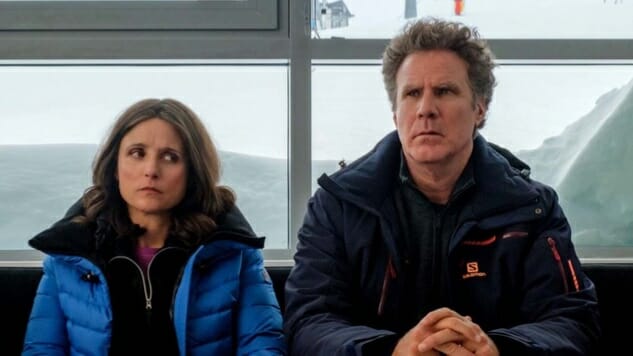Snow Problem: Julia Louis-Dreyfus and Will Ferrell talk Downhill

It would be hard to find two funnier actors to star in a movie than Julia Louis-Dreyfus and Will Ferrell. But is Downhill, the Force Majeure-inspired film that played this year’s Sundance Film Festival, a comedy at all? Louis-Dreyfus and Ferrell sat down with us to discuss that question, as well as some much more serious questions about life, death and relationships.
Paste Magazine: I’ve never interviewed either one of you before, but I’d like to go deep quick.
Will Ferrell: Okay.
Julia Louis-Dreyfus: I like it. Let’s do it. Let’s go.
Paste:This film is about a tragedy or near tragedy that forces two people to question everything. So I’m curious if each of you would be willing to share something in your life that happened that was hard for you as an adult, and how you got through it.
Louis-Dreyfus: Well, I can answer that honestly. I was diagnosed with breast cancer a couple of years ago, and that was a crisis of enormous proportions. And a long, long time ago—and this is separate from having breast cancer—my husband and I were somewhat newly married, and we went on this trip on a boat. We were swimming with dolphins and scientists who are recording these dolphins. It was really cool. I was in the water, and my husband was on the boat, and all of a sudden he comes to the stern of the boat and says, “Jules.” And his voice sounds different. “I need you to come back to the boat right now. There’s a shark in the water.” I heard that, and all I did was look at the ladder and I was so far away, and it was like a 10-foot bull shark. I saw that ladder and everything else fell away. I was just getting to the ladder, and that’s what—uh oh, I’m going to get choked up—that’s what going through [the breast cancer diagnosis and treatment] was like for me. We were in a bunker together. Me, my family and my friends just, eyes on the prize, eyes on the prize. That’s how it worked for me.
Will, what happened to you? You got a parking ticket once, right?
Will Ferrell: I forgot to file my taxes. No, I’ve been through some crazy stuff, like three major car accidents that easily could’ve killed me or maimed me permanently in some way. But gosh, obviously emerging from all of those episodes—feeling thankful and life can change on a dime and etc., etc.—but I was lucky enough to be able to recover in such a way that there wasn’t a lasting effect that was debilitating in any way, or something where I really had to seek outside counsel or help in some way.
Paste: Sure.
Ferrell: As we’re just thinking out loud, being in New York during 9/11, in a weird way, being on Saturday Night Live. During the course of the next couple of weeks, it was living through that thing of like, is irony dead? Will we ever be able to be funny again? What was our role, not only in comedy at that time, but culturally? What were we supposed to do or not do? Do you shut the show down until you figure it out? Is it okay? I don’t know if it’s applicable to your initial question, but that pops in my head as a thing where we all really had to kind of cope with that. I remember going on a jog through Central Park that day, after that season had started that year, and a woman just grabbed me and was like, “Thanks for last night.” That was great.
Louis-Dreyfus: That’s very gratifying.
Ferrell: I don’t know if the show was even that good, but it just was familiar.
-

-

-

-

-

-

-

-

-

-

-

-

-

-

-

-

-

-

-

-

-

-

-

-

-

-

-

-

-

-

-

-

-

-

-

-

-

-

-

-








































